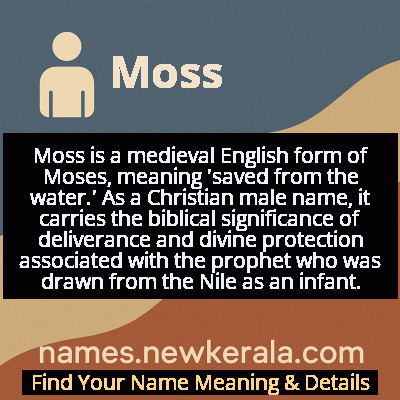Moss Name Meaning & Details
Origin, Popularity, Numerology Analysis & Name Meaning of Moss
Discover the origin, meaning, and cultural significance of the name MOSS. Delve into its historical roots and explore the lasting impact it has had on communities and traditions.
Name
Moss
Gender
Male
Origin
Christian
Lucky Number
3
Meaning of the Name - Moss
Moss is a medieval English form of Moses, meaning 'saved from the water.' As a Christian male name, it carries the biblical significance of deliverance and divine protection associated with the prophet who was drawn from the Nile as an infant.
Moss - Complete Numerology Analysis
Your Numerology Number
Based on Pythagorean Numerology System
Ruling Planet
Jupiter
Positive Nature
Optimistic, inspirational, and creative.
Negative Traits
Scattered, exaggerating.
Lucky Colours
Yellow, gold, purple.
Lucky Days
Thursday.
Lucky Stones
Yellow sapphire.
Harmony Numbers
1, 2, 9.
Best Suited Professions
Arts, writing, communication.
What People Like About You
Creativity, optimism.
Famous People Named Moss
Moss Hart
Playwright and Director
Tony Award-winning Broadway director and Pulitzer Prize-winning playwright
Moss Cass
Politician and Physician
Australian Minister for the Environment and prominent health reform advocate
Moss Johnston
Business Executive
Former CEO of Boral Limited, leading Australian construction materials company
Name Variations & International Equivalents
Click on blue names to explore their detailed meanings. Gray names with will be available soon.
Cultural & Historical Significance
This name reflects the medieval practice of making sacred texts and figures more relatable to common people through linguistic adaptation, serving as a bridge between ancient religious tradition and everyday Christian life in medieval England. The persistence of Moss as a given name demonstrates how biblical narratives were woven into the fabric of English-speaking Christian communities across centuries, maintaining a connection to foundational religious stories while adapting to evolving linguistic landscapes.
Extended Personality Analysis
Individuals named Moss are often perceived as possessing a calm, grounded demeanor with deep spiritual or philosophical inclinations. They tend to exhibit natural leadership qualities combined with a strong sense of justice and moral conviction, reflecting the characteristics of their biblical namesake. Mosses are typically seen as resilient individuals who can navigate challenging circumstances with wisdom and patience, often demonstrating a protective nature toward those in their care and showing remarkable perseverance when committed to a cause.
Their personality frequently blends traditional values with innovative thinking, making them effective at bridging different perspectives or communities. Many Mosses display a quiet confidence that inspires trust in others, and they often serve as stabilizing influences in their social or professional circles. The combination of their biblical heritage and the natural symbolism of moss as a plant suggests individuals who are both deeply rooted in their principles and adaptable to changing environments, capable of sustained growth through patience and determination.
Modern Usage & Popularity
In contemporary times, Moss remains a relatively uncommon but distinctive choice for boys, particularly among parents seeking biblical names with historical depth but less common than mainstream options like Matthew or John. The name has experienced a modest resurgence in recent years as part of the trend toward vintage and nature-inspired names, though it maintains its strong Christian associations. It ranks outside the top 1000 names in most English-speaking countries, giving it an exclusive quality while remaining recognizable. Modern usage often reflects appreciation for both its religious heritage and its connection to the natural world, as 'moss' also refers to the small, resilient plants that create lush green carpets in forests. This dual significance appeals to parents who value both spiritual meaning and environmental consciousness.
Symbolic & Spiritual Meanings
Symbolically, Moss carries multiple layers of meaning that extend beyond its direct biblical translation. As a derivative of Moses, it represents deliverance, leadership, and divine guidance—themes central to the Exodus narrative. The name also evokes the natural symbolism of moss itself, which signifies resilience, patience, and the ability to thrive in challenging conditions. Moss grows slowly but persistently, covering landscapes with quiet determination, much like how individuals bearing this name often exhibit steady, consistent character development. In Christian symbolism, the water association connects to baptism and spiritual rebirth, while the leadership aspect reflects the calling to guide others through difficult transitions. The name ultimately symbolizes a bridge between the earthly and divine, the natural and spiritual, embodying both grounded stability and elevated purpose.

